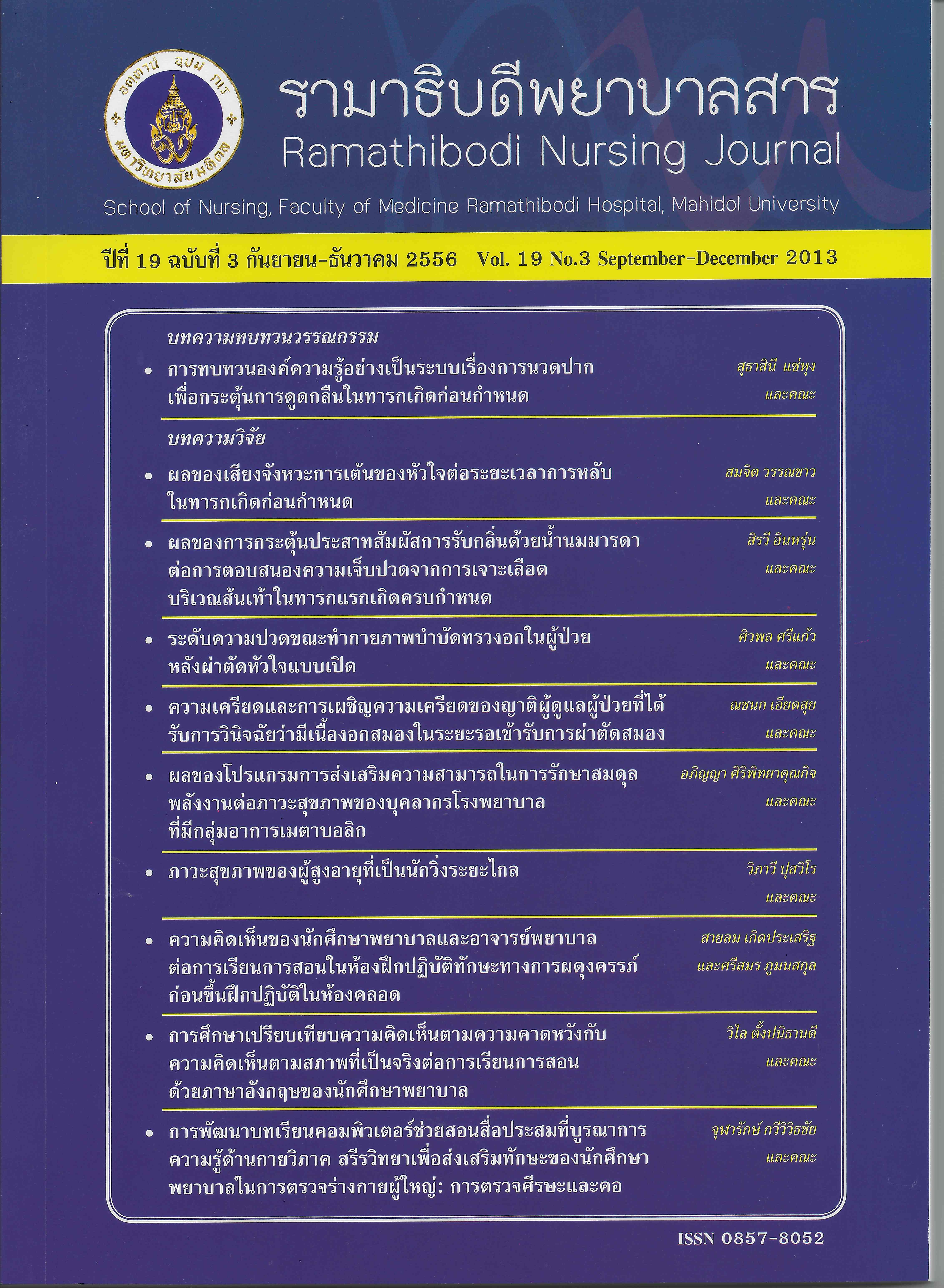ความเครียดและการเผชิญความเครียดของญาติผู้ดูแลผู้ป่วยที่ได้รับการวินิจฉัยว่ามีเนื้องอกสมอง ในระยะรอเข้ารับการผ่าตัดสมอง
Main Article Content
Abstract
บทคัดย่อ:
การวิจัยเชิงบรรยายนี้มีวัตถุประสงค์เพื่อศึกษาความเครียด ระดับความเครียด และการเผชิญความเครียดของญาติผู้ดูแลผู้ป่วยที่ได้รับการวินิจฉัยว่ามีเนื้องอกสมอง ระยะรอเข้ารับการผ่าตัดสมอง โดยใช้ทฤษฎีความเครียดและการเผชิญความเครียดของลาซารัสและโฟล์คแมนเป็นกรอบแนวคิดในการวิจัย กลุ่มตัวอย่างเป็นญาติผู้ดูแลหลักของผู้ป่วยที่ได้รับการวินิจฉัยเป็นเนื้องอกสมอง ระยะรอเข้ารับการผ่าตัดสมอง จำนวน 62 ราย ซึ่งพาผู้ป่วยมารับการตรวจรักษาที่โรงพยาบาลระดับตติยภูมิ เลือกกลุ่มตัวอย่างแบบเฉพาะเจาะจง เครื่องมือที่ใช้ในการวิจัย ได้แก่ แบบบันทึกข้อมูลส่วนบุคคล แบบสัมภาษณ์ความเครียด แบบวัดระดับความเครียด และแบบวัดการเผชิญความเครียด (Jalowiec Coping Scale) วิเคราะห์ข้อมูลด้วยสถิติบรรยายและวิเคราะห์เนื้อหา (content analysis) ผลการวิจัยพบว่า ความเครียดที่เกิดขึ้นจากการดูแลของญาติผู้ดูแลมี 2 ลักษณะ คือ 1) ความเครียดที่เกิดขึ้นจากการให้การดูแลโดยตรง ได้แก่ ความต้องการการดูแลที่เกิดจากพยาธิสภาพของเนื้องอกสมอง การเผชิญกับอารมณ์และพฤติกรรมที่เปลี่ยนแปลงของผู้ป่วย การเผชิญกับโอกาสสูญเสีย กังวลเกี่ยวกับความไม่แน่นอนของการรักษา และ 2) ความเครียดจากผลกระทบต่อชีวิตญาติผู้ดูแล ได้แก่ ผลกระทบด้านร่างกาย ผลกระทบด้านอารมณ์จิตใจ การเปลี่ยนแปลงในการดำเนินชีวิต และผลกระทบด้านเศรษฐกิจสังคม ระดับความเครียดของญาติผู้ดูแลอยู่ในระดับสูง ญาติผู้ดูแลใช้การเผชิญความเครียดทุกด้านร่วมกัน โดยใช้การเผชิญความเครียดด้านการเผชิญหน้ากับปัญหามากที่สุด รองลงมาคือ ด้านการบรรเทาความรู้สึกเครียดและด้านการจัดการกับอารมณ์ ตามลำดับ ผลจากการวิจัยในครั้งนี้ สามารถนำไปเป็นข้อมูลพื้นฐานสำหรับวางแผนการพยาบาลเพื่อประเมินความเครียดจากการให้การดูแล และช่วยเหลือสนับสนุนให้ญาติผู้ดูแลใช้วิธีการเผชิญความเครียดในการดูแลผู้ป่วยเนื้องอกสมองได้อย่างเหมาะสม
คำสำคัญ: ความเครียด การเผชิญความเครียด ญาติผู้ดูแล เนื้องอกสมอง การผ่าตัดสมอง
Abstract:
This descriptive study aimed to explore the stress, stress level, and coping among family caregivers of the patients with brain tumor awaiting for cranial surgery. The Lazarus and Folkman stress, appraisal and coping theory was used as the conceptual framework of the study. Sixty–two family caregivers of the patients with brain tumors awaiting for cranial surgery were purposively recruited at the time they visited at tertiary hospital. The research instruments composed of the demographic characteristics questionnaire, a semi–structured interview, the stress level scale, and the Jalowiec Coping Scale. Data were analyzed using descriptive statistics and content analysis. The results revealed that stress of family caregivers could be divided into two types: 1)stress directly caused by provision of care including caregiving demands of the pathology of brain tumor, dealing with emotional and behavioral changes of patients, facing opportunity of loss, and concern caused by uncertainty of treatment, and 2)stress caused by the effects on the life of caregivers, which could further be categorized into physical effects, psycho-emotional effects, lifestyle change, and socioeconomic effects. The findings also showed that family caregivers had a high level of stress and they used all types of coping strategies, confrontive coping, followed by palliative coping, and emotive coping, respectively. The study findings could be used as baseline data to plan for a clinical nursing practice guideline to assess caregiving stress and to promote appropriate coping among family caregivers of patients with brain tumors.
Keywords: Stress, Coping, Family caregiver, Brain tumor, Cranial surgery
Article Details
บทความ ข้อมูล เนื้อหา รูปภาพ ฯลฯ ที่ได้รับการตีพิมพ์ในรามาธิบดีพยาบาลสาร ถือเป็นลิขสิทธิ์ของวารสาร หากบุคคลหรือหน่วยงานใดต้องการนำทั้งหมดหรือส่วนหนึ่งส่วนใดไปเผยแพร่หรือเพื่อกระทำการใด ใด จะต้องได้รับอนุญาตเป็นลายลักษณ์อักษรจากรามาธิบดีพยาบาลสารก่อนเท่านั้น


